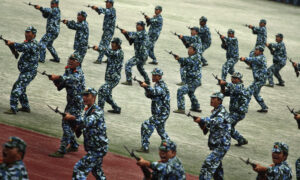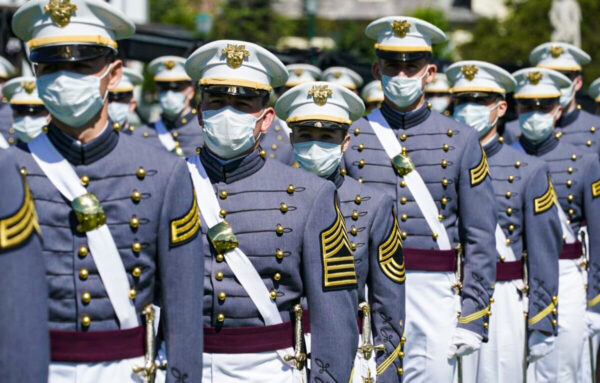The Inextricable Link Between Military Life and Mental Health Issues
CommentaryThe Chinese Communist Party (CCP), we’re told, is building a military to invade Taiwan by the end of the decade. In recent times, however, this building process has hit a rather sizable stumbling block that could derail its plans of “unification” with its iron-willed neighbor. The South China Morning Post’s Amber Wang recently discussed how a mental health crisis is weakening China’s military. Take China’s submarine force, for example. One in five male sailors, noted Wang, have experienced mental health problems (a vague description that can refer to just about anything, from eating disorders to suicidal ideation). In a desperate attempt to address the crisis, the People’s Liberation Army has introduced various counseling services and courses designed to equip troops with the tools necessary to cope with the stresses of physical combat. A brigade from the 73rd Group Army just launched online psychological services to assist officers and soldiers experiencing “fearful emotions” after participating in demanding field training exercises. As people are the “decisive factor in combat,” writes Wang, “mental stability is key to effectiveness.” Indeed. She’s 100 percent right. Unfortunately, these members of the Chinese military happen to reside in a country where a stigma surrounding mental health issues reigns supreme. After all, this is communist China we are talking about, a country ruled by a party that has inflicted unimaginable amounts of physical and psychic suffering on its citizens. Beijing’s draconian COVID-19 policies, only abandoned a few weeks ago after tens of thousands of protesters took to the streets, were so severe that some people chose to take their own lives. The only reason Beijing is so concerned about its military members struggling with various mental health issues is that the CCP needs them to be ready for war, to function as cold-blooded killers unburdened by unnecessary “distractions.” They are receiving treatment because they are preparing for battle. If these individuals do play a role in the invasion of Taiwan, then the United States is likely to intervene. Which begs the question: What about the mental state of U.S. military members? U.S. Military Academy cadets attend the 2020 graduation ceremony at West Point, New York, on June 13, 2020. (Timothy A. Clary/AFP via Getty Images) In March 2022, Defense Secretary Lloyd Austin announced the creation of a special committee designed to assess and improve the military’s mental health and suicide prevention programs. The announcement was well-received on both sides of the political aisle (although some could ask, what took so long?). Between 2015 and 2020, suicides among active-duty service members jumped by a staggering 40 percent. According to a 2021 report by the Costs of War Project, a team consisting of dozens of scholars, legal experts, medical doctors, and human rights practitioners, since 9/11, four times as many active duty members have taken their lives than have died in combat. Specifically, at the time of the report, 30,177 had died by suicide, and 7,057 individuals had been killed in post-9/11 active duties. The report stressed that rates of suicide for “both veterans and active duty personnel” are fast, overtaking those of the general population. This, the authors added, marks “an alarming shift,” as suicide rates among the general population have historically been far higher than suicide rates among service members. The report found that multiple factors have played a role in higher suicide rates, including trauma, stress, military culture (more on this point in a minute), easy access to guns, and extreme difficulty readjusting to civilian life. Previously, when researchers asked soldiers at Fort Carson, a U.S. Army post located south of Colorado Springs, why they attempted to commit suicide, the majority of respondents cited a burning desire to put an end to the “intense emotional distress” that they were experiencing. This is concerning on many levels. Although the United States is not China, there is significant work to be done when it comes to views on mental health issues. Unfortunately, across the country, the stigma surrounding certain mental illnesses like schizophrenia and alcoholism is on the rise. The U.S. military is known for its heavy-drinking culture; in fact, it is America’s heaviest-drinking profession. The association between alcohol abuse and mental health struggles is well known. When we discuss war, we often discuss the countries involved, forgetting that these wars are fought by human beings who struggle with the anxieties and concerns that plague everyday civilians. China isn’t the only country struggling to help its members cope with the realities of war. The United States has significant work to do. Now, more than ever, the brave men and women sacrificing their lives for the United States need all the help they can get. Views expressed in this article are the opinions of the auth

Commentary
The Chinese Communist Party (CCP), we’re told, is building a military to invade Taiwan by the end of the decade. In recent times, however, this building process has hit a rather sizable stumbling block that could derail its plans of “unification” with its iron-willed neighbor.
The South China Morning Post’s Amber Wang recently discussed how a mental health crisis is weakening China’s military. Take China’s submarine force, for example. One in five male sailors, noted Wang, have experienced mental health problems (a vague description that can refer to just about anything, from eating disorders to suicidal ideation). In a desperate attempt to address the crisis, the People’s Liberation Army has introduced various counseling services and courses designed to equip troops with the tools necessary to cope with the stresses of physical combat. A brigade from the 73rd Group Army just launched online psychological services to assist officers and soldiers experiencing “fearful emotions” after participating in demanding field training exercises. As people are the “decisive factor in combat,” writes Wang, “mental stability is key to effectiveness.” Indeed. She’s 100 percent right.
Unfortunately, these members of the Chinese military happen to reside in a country where a stigma surrounding mental health issues reigns supreme. After all, this is communist China we are talking about, a country ruled by a party that has inflicted unimaginable amounts of physical and psychic suffering on its citizens. Beijing’s draconian COVID-19 policies, only abandoned a few weeks ago after tens of thousands of protesters took to the streets, were so severe that some people chose to take their own lives.
The only reason Beijing is so concerned about its military members struggling with various mental health issues is that the CCP needs them to be ready for war, to function as cold-blooded killers unburdened by unnecessary “distractions.” They are receiving treatment because they are preparing for battle. If these individuals do play a role in the invasion of Taiwan, then the United States is likely to intervene. Which begs the question: What about the mental state of U.S. military members?

In March 2022, Defense Secretary Lloyd Austin announced the creation of a special committee designed to assess and improve the military’s mental health and suicide prevention programs. The announcement was well-received on both sides of the political aisle (although some could ask, what took so long?).
Between 2015 and 2020, suicides among active-duty service members jumped by a staggering 40 percent. According to a 2021 report by the Costs of War Project, a team consisting of dozens of scholars, legal experts, medical doctors, and human rights practitioners, since 9/11, four times as many active duty members have taken their lives than have died in combat. Specifically, at the time of the report, 30,177 had died by suicide, and 7,057 individuals had been killed in post-9/11 active duties. The report stressed that rates of suicide for “both veterans and active duty personnel” are fast, overtaking those of the general population. This, the authors added, marks “an alarming shift,” as suicide rates among the general population have historically been far higher than suicide rates among service members. The report found that multiple factors have played a role in higher suicide rates, including trauma, stress, military culture (more on this point in a minute), easy access to guns, and extreme difficulty readjusting to civilian life.
Previously, when researchers asked soldiers at Fort Carson, a U.S. Army post located south of Colorado Springs, why they attempted to commit suicide, the majority of respondents cited a burning desire to put an end to the “intense emotional distress” that they were experiencing.
This is concerning on many levels. Although the United States is not China, there is significant work to be done when it comes to views on mental health issues. Unfortunately, across the country, the stigma surrounding certain mental illnesses like schizophrenia and alcoholism is on the rise. The U.S. military is known for its heavy-drinking culture; in fact, it is America’s heaviest-drinking profession. The association between alcohol abuse and mental health struggles is well known.
When we discuss war, we often discuss the countries involved, forgetting that these wars are fought by human beings who struggle with the anxieties and concerns that plague everyday civilians. China isn’t the only country struggling to help its members cope with the realities of war. The United States has significant work to do. Now, more than ever, the brave men and women sacrificing their lives for the United States need all the help they can get.
Views expressed in this article are the opinions of the author and do not necessarily reflect the views of The Epoch Times.












